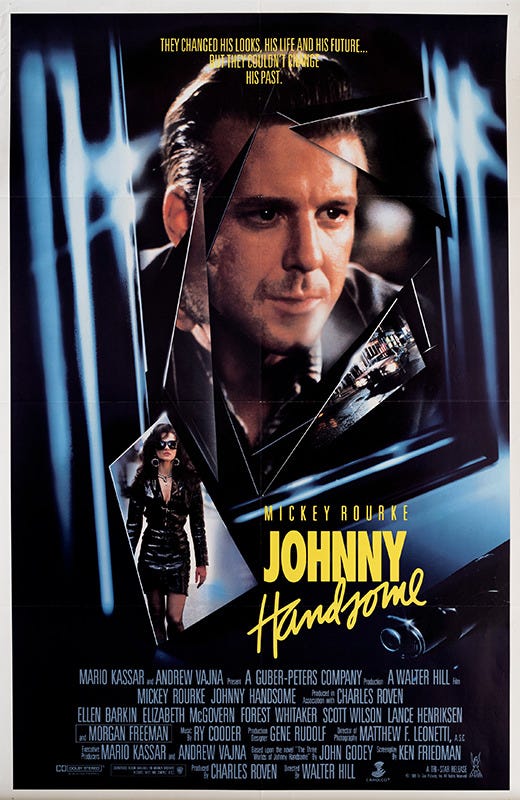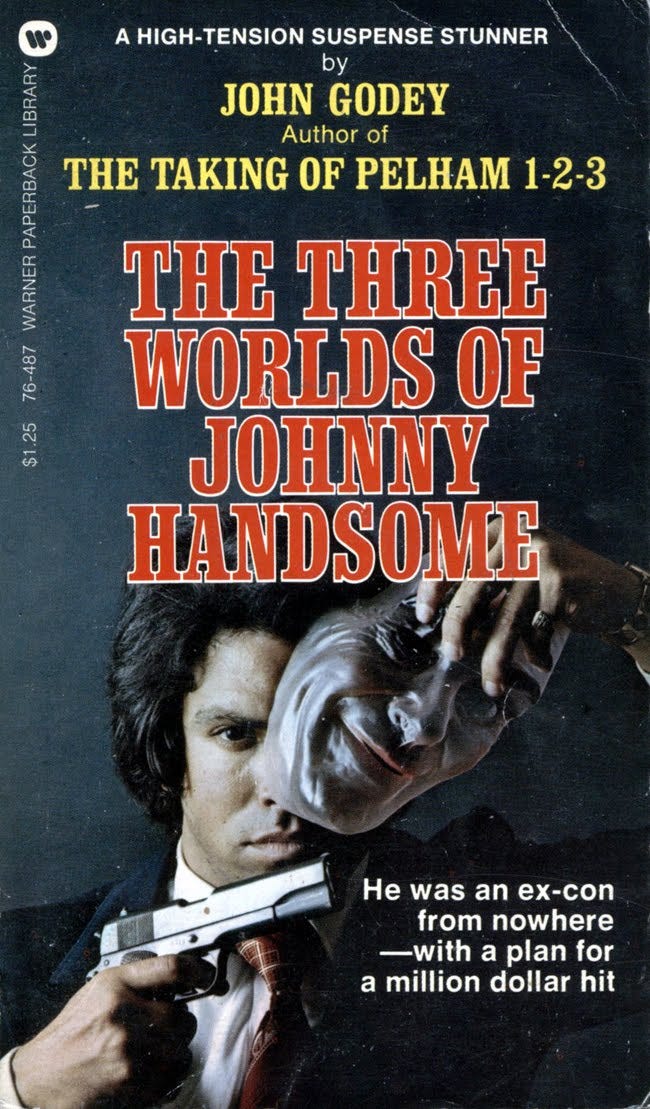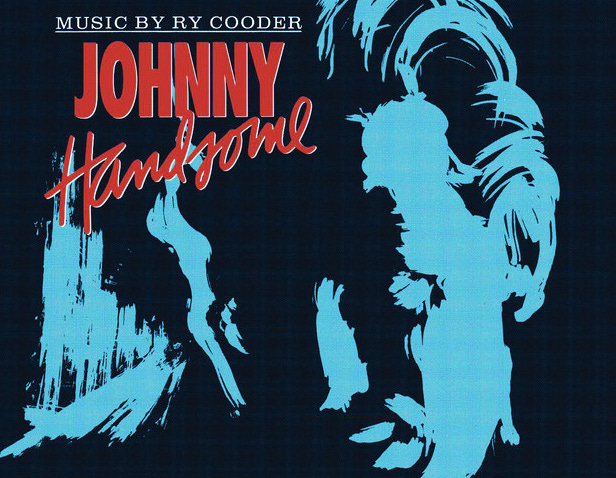I’m a huge fan of filmmaker and writer Walter Hill. He deserves his own post for another day. But today is about JOHNNY HANDSOME. A movie not a lot folks dig, but it’s a strange favourite since I first saw it back in 1989.
In the movie, we meet John Sedley, moments before he pulls off a diamond heist. John is not just any crook though, he is a mastermind in pulling off robberies. Also, his face is severely disfigured due to an anomaly in his genes. His deformity doesn’t stop him from doing what he has to do. Johnny is pulling off this diamond heist with the help of two individuals. One is a lady called Sunny Boyd (Ellen Barkin) and the other a low life called Rafe Garrett (Lance Henriksen). The three stick up the diamond store, and as we might expect in this kind of movie, things get ugly. The cops are called upon and at the last minute Rafe and Sunny decide to double cross Johnny and shoot him and the owner of the store, their idea is to keep the loot to themselves. Rafe and Sunny leave John for dead, unfortunately for them, John doesn’t die. Instead, he is rescued by the police and taken to a hospital where he is given the opportunity to jumpstart his life. You see, the doctors want to perform a surgery on him that could give him a normal face again. Will he take this opportunity to begin again? Or will he go back to his old ways?
JOHNNY HANDSOME plays out a lot like a ‘Dr Jekyll and Mr. Hyde’ story where the main character has a duality about him. Johnny used to be a crook, because his looks led him to become an outcast, ridiculed and made fun of all his life. But what happens when he gets a new face and he no longer looks like a monster? What kind of battle will be waged with the demons inside of him? This is what is at the center of this story. Johnny is even given a chance to fall in love with a beautiful woman, and lead a normal life, unfortunately, his former life calls him. Revenge calls him. Should he heed its call?
This is a Walter Hill film, so it’s not just any director we’re talking about here. This is the guy behind such action packed 80’s classics as 48 HOURS (1982), EXTREME PREJUDICE (1987) and RED HEAT (1988). This movie is darker, grittier, and more character driven. The film starts with a shootout and ends with a shootout, the middle of the film is the whole process of Johnny going from looking like a monster, to looking like Mickey Rourke before he turned to boxing.
Hill invests a good amount of time getting you to know Johnny, getting you to feel for him. Rourke does a good job here, he plays the tormented soul, you feel like he’s the Frankenstein monster; a misunderstood creature who’s just looking for some love. During the first half of the film, Rourke plays his character through heavy amounts of makeup. But half way through the film, after the operation, he transforms, and then we get the real Mickey Rourke.
The rest of the film is populated by an excellent cast of supporting characters who almost steal the movie. At times it feels like they are acting in a different story. To be honest, I think the tonal shift from character study to pulp crime caper is what makes the movie uneven at times. Ellen Barkin plays a woman with no moral values whatsoever, she hangs out in bars, stealing, killing and double crossing. She hangs out with low lives like Henriksen’s Rafe Garrett. Henriksen has always been great at playing villains, here he plays another baddy, not much of a stretch acting wise, and he’s always excellent. Rounding things up are Morgan Freeman as a cop who knows Johnny’s true nature, and Forest Whitaker as the doctor who operates on Johnny. Whitaker wants to give Johnny that second chance and to improve himself.
The film didn’t hit it big in theaters, in fact, it was a downright flop. It cost 20 million to make but only raked in 7.2 at the box office. I guess the film really didn’t connect with audiences for some reason. A pity because the film is a good revenge tale. Why exactly did it slip through the cracks? Maybe it was due to the fact that it had some hefty competition at the box office? I guess a dark, brooding film about a deformed crook wasn’t at the top of anyones list.
In Dark Passage, a cab driver tells the pre-plastic surgery Parry, “It’s funny. From faces, I can tell what people think, what they do, sometimes even who they are.” But what do we do when an actor, whose face is his most defining feature, keeps changing it? Will he ever be truly knowable? What story does Mickey Rourke’s face tell? He has once again been relegated to cinema’s margins, making direct-to-streaming films every year or so that are far beneath his capability. His performance several years ago in The Wrestler, its self-reflexivity infusing the story of a washed-up has-been whose body is letting him down, who climbs to the top rope to pull off his signature splash move even though the doctors have told him his heart may give out, demonstrates there is still a remarkable, sensitive actor beneath the surgeries, beneath the cigarette-choked voice, beneath the bravado and bluster and sunglasses and hair and eccentric clothing. Rourke’s neo-noir characters, especially, reckon with the pain of disappointment through their visions of what a face means—who you are, who you were, who you might have been, who you will never be. Mickey Rourke’s faces change; his power as an actor doesn’t.
From HANDSOME JOHNNY FAVOURITE.
She was looking at him appraisingly. "You're handsomer than Tully. You know that?"
He nodded and said, "I'll be the best-looking man in the whole cemetery."
Great read about the book, THE CINEMATIC WORLDS OF JOHNNY HANDSOME at The Paperback Film Projector.
The movie also has a great soundtrack!
More down the road.
Cheers,
TC.





